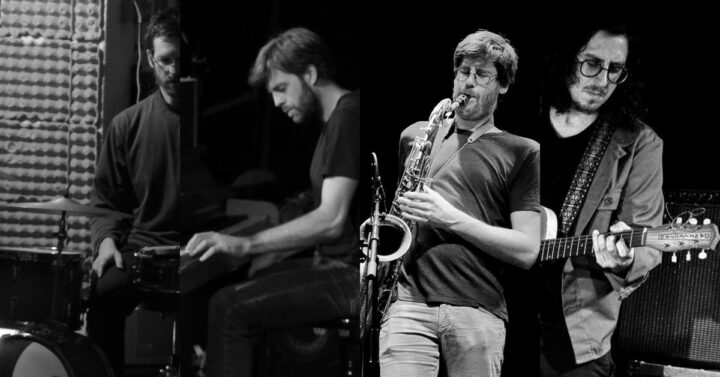Jure Planinšek – Drums
Alen Grižonič Lesar – Piano
Photos copyright by Alen Grižonič Lesar / Sara Zlanabitnig
Gnigler/Schneider:
Jakob Gnigler – Tenorsaxophon
Markus W. Schneider – E-Gitarre
Photos copyright by Eckhart Derschmidt
Concert – 20:00
Interrupted system call:
The tandem, split between Slovenia and Vienna, consists of Jure Planinšek, a multi-instrumentalist, and above all a drummer or percussionist, and Alen Grižonič, a pianist living in Vienna. They recorded their debut album „2 + 2 ist um 3 Uhr gleich 4 / 2 + 2 je ob treh enako 4“ under the name Interrupted System Call in Vienna, the birthplace of Ludwig Wittgenstein, one of the leading analytical philosophers of the twentieth century. In the Logical-Philosophical Treatise, Wittgenstein deals with language or the formalization of it and, consequently, the formality of the world. Through the logical-mathematical theory, according to which the world is a totality of facts, not things, he addresses philosophical problems and shows in the book that the basic problem is a misunderstanding of the logic of language. The whole world is revealed to him as a tautology, a hierarchically ordered system of sentences and paragraphs that do not say anything, the key is what they show or paint. So the world is based on truth, on facts, not on things. The world is what we are capable of thinking and, heh, hearing. The conclusion of the sentences must necessarily be correct and error-free, and it is precisely the error that brings content into the world. Maybe a system error Interrupted system call?
(Jure Boršič, Radio Študent)
The design of their new album, which refers to Hegel’s philosophy, ensures that things are not so simple. The title is again bilingual, Slovenian and German, „Tu je roža, tu pleši / Hier is die Rose, hier tanze“. Unlike (late) Wittgenstein, Hegel is a system philosopher. If the former discovers how language behaves on the surface and does not look for a specific meaning behind it, for Hegel meaning is omnipresent: everything has its meaning with its purpose, which is most evident in history. At the level of logic, Hegel is known for his dialectics. Within the dialectical process, opposites meet and prevail in something new. Dialectics is simultaneously a form of thinking and a historical event. Even within the historical process, there are new formations that emerge from the friction of opposites. The connection with our duo is designed with the fact that it consists of two musicians, that in their sets two sources of sound meet. As they said in an interview for Radio Študent, they are investigating where a mistake or a collision occurs in their game. Improvisation is never pure, never starts from scratch, but always follows the minimum of some pattern. The meaning of improvisation occurs precisely in a mistake, which can be understood as the meeting of two contradictions.
We therefore defend the opinion that they should be listened to together and understood as parts of the same conceptual whole. Only in this way can we see their importance not only for the domestic improvisational scene, but also for philosophy …
(Muanis Sinanović, SIGIC)
Gnigler/Schneider:
Kurze Szenen wären das, wenn es ein Film wäre. Es ist aber nur die Musik. Und die lässt bald Schauriges erahnen, bald Melancholisches oder sogar Kitschiges. In ihrer präsenten Artikulation und exaltierten Aufführung zeigt sie aber immer etwas Überzeichnetes. „Wir schauen über den Tellerrand und sind dann meistens vollkommen drüber.“, sagte einst jemand.
Die Klänge der beiden Instrumente verschmelzen in dieser Überhitzung zu einem einzigen, expressionistischen Sound; die nie geplante Musikmaschine dieser Epoche hätte solche Töne gespien. Dabei war die ursprüngliche Idee ja die Suche nach den Songs des Jahrtausends.

